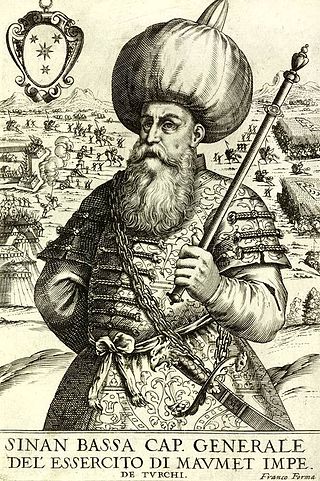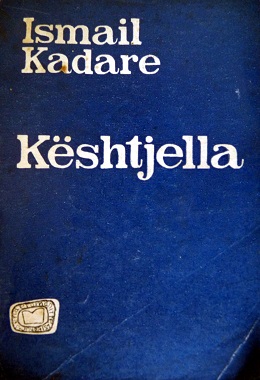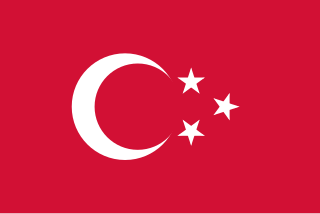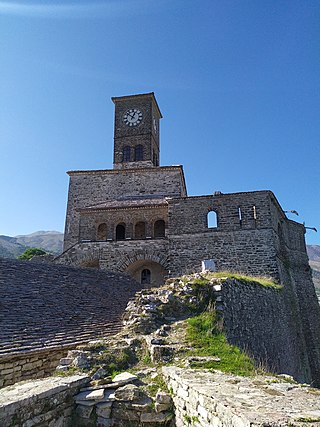
Ismail Kadare was an Albanian novelist, poet, essayist, screenwriter, and playwright. He was a leading international literary figure and intellectual. He focused on poetry until the publication of his first novel, The General of the Dead Army, which made him famous internationally.

Ali Pasha, or Ali Pasha of Tepelena, commonly known as Ali Pasha of Ioannina, was an Albanian ruler who served as Ottoman pasha of the Pashalik of Yanina, a large part of western Rumelia. Under his rule, it acquired a high degree of autonomy and even managed to stay de facto independent. The capital of the Pashalik was Ioannina, which, along with Tepelena, was Ali's headquarters.
The Kanun is a set of Albanian traditional customary laws, which has directed all the aspects of the Albanian tribal society.

Koca Sinan Pasha was an Albanian-born Ottoman Grand Vizier, military figure, and statesman. From 1580 until his death he served five times as Grand Vizier.
Albanian literature stretches back to the Middle Ages and comprises those literary texts and works written in Albanian. It may also refer to literature written by Albanians in Albania, Kosovo and the Albanian diaspora particularly in Italy. Albanian occupies an independent branch within the Indo-European family and does not have any other closely related language. The origin of Albanian is not entirely known, but it may be a successor of the ancient Illyrian language.

Alemdar Mustafa Pasha was an Ottoman military commander and grand vizier.
David Bellos is a British academic, translator and biographer. He is the Meredith Howland Pyne professor of French and comparative literature at Princeton University in the United States, and was director of its translation and intercultural communication programme from 2007 to 2019.

Mustafa Naili Pasha was an Ottoman-Albanian statesman, who held the office of Grand Vizier during the reign of Abdülmecid I, the first time between 14 May 1853 and 29 May 1854, and the second time between 6 August 1857 and 22 October 1857.

Broken April is a novel by Albanian author Ismail Kadare. Published in 1978, the book explores one of Kadare's recurring themes: how the past affects the present. The novel concerns the centuries-old tradition of hospitality, blood feuds, and revenge killing in the highlands of north Albania in the 1930s. It was translated into English by John Hodgson for New Amsterdam Books in 1990.

The Siege is a historical novel by Albanian author Ismail Kadare, first published in 1970 in Tirana as Kështjella. It concerns the siege of an unnamed Albanian fortress by troops of the Ottoman Empire during the time of Skanderbeg, loosely based on the historical Siege of Krujë (1450). It was translated into French by Jusuf Vrioni and then from French into English by David Bellos. The novel was partly rewritten by Kadare after he moved from Albania to France in 1990; most of the changes were references to the Christian beliefs of the Albanian garrison, which had been cut from the original version by the communist censors.

Chronicle in Stone is a novel by Albanian author Ismail Kadare. First published in Albanian in 1971, and translated into English by Arshi Pipa in 1987, it describes life in a small Albanian city during World War II. A revised translation by David Bellos was published in 2007.

The Khedivate of Egypt was an autonomous tributary state of the Ottoman Empire, established and ruled by the Muhammad Ali Dynasty following the defeat and expulsion of Napoleon Bonaparte's forces which brought an end to the short-lived French occupation of Lower Egypt. The Khedivate of Egypt had also expanded to control present-day Sudan, South Sudan, Eritrea, Djibouti, northwestern Somalia, northeastern Ethiopia, Lebanon, Jordan, Palestine, Syria, Greece, Cyprus, southern and central Turkey, in addition to parts from Libya, Chad, Central African Republic, Democratic Republic of Congo, and Uganda, as well as northwestern Saudi Arabia, parts of Yemen and the Kingdom of Hejaz.

Gjirokastër Castle is a fortress in Gjirokastër, Albania. Gjirokastër Castle is situated at a height of 336 metres (1,102 ft).
The Massacre of the Albanian beys occurred on 9 August 1830, when around 500 Albanian leaders (beys) and their personal guards were killed by Ottoman forces in the town of Manastir. The massacre led to the weakening of the power of the beys of southern Albania and also set the basis for the destruction of the powerful northern Albanian Pashalik of Scutari.
Bayezid Pasha or Beyazid Pasha was an Ottoman-Albanian statesman who served as grand vizier of the Ottoman Empire from 1413 to 1421. He was the first Albanian and first Muslim from Balkans to become Grand Vizier of the Ottoman state.
The Albanian revolts of 1833–1839 took place in Albania as a reaction against the new centralizing policy of Ottoman administration.
The Şahkulu rebellion was a widespread pro-Shia and pro-Safavid uprising in Anatolia, directed against the Ottoman Empire, in 1511. It began among the Turkmen tribes of the Taurus mountains, before spreading to a wide variety of disgruntled groups. It is named after the leader of the rebels, Şahkulu. His death in battle also meant the end of the uprising.

Elegy for Kosovo is an Albanian novel written by Ismail Kadare.

The Palace of Dreams is a 1981 novel by the Albanian writer Ismail Kadare. Set ostensibly in the Ottoman Empire, but in a deliberately imprecise past shaded by myth and intended to represent the modern totalitarian state, The Palace of Dreams follows the rapid rise of Mark-Alem, a young Ottoman Albanian related to the powerful Köprülü family, within the bureaucratic regime of the title palace, a shady ministry whose objective is to gather, examine and interpret the dreams of the empire's subjects in order to uncover the master-dreams, which are believed to show the future destiny of the Sultan and the state.

The Successor is a 2003 novel by the Albanian writer and inaugural International Man Booker Prize winner Ismail Kadare. It is the second part of a diptych of which the first part is the novella Agamemnon's Daughter. The diptych is ranked by many critics among the author's greatest works.













